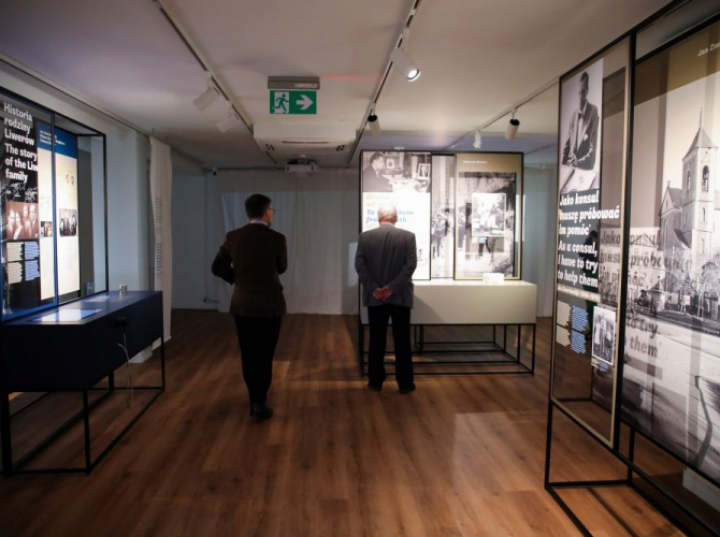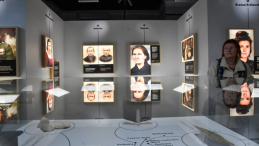The activities of Polish and foreign diplomats during the war years are a worthy reason to be proud, said Piotr Gliński, Minister of Culture and National Heritage, on Friday at the opening of the exhibition “Decision: To Save Mankind”, dedicated to the activities of Polish diplomats saving people Jewish.
The head of the Ministry of Culture said that the heroes of the opening exhibition were members of the Ładoś Group, but at the exhibition visitors will also see profiles of other Polish and foreign diplomats involved in aid. He also added that the activities of Polish officials should be remembered especially eighty years after the end of the war. The decision: to save humanity – how contemporary the title of this exhibition is in an era of aggressive wars, cruel occupations and acts of terror also directed against the civilian population. This is the story of Polish and foreign diplomats from World War II who, working together and with Jewish communities around the world, saved thousands of lives,” said Piotr Gliński.
“The activity of Polish and foreign diplomats during the war years is a matter of justifiable pride. “Their achievements are proof of unimaginable courage and humanity,” stressed the Head of the Ministry of Culture and National Heritage. At the same time, he pointed out that because of communism, Polish diplomats could not return to their homeland and remained in exile, often in difficult living conditions. As an example of the most tragic post-war fate, Piotr Gliński points to Konstanty Rokicki, who “died in Switzerland and was buried in a mass grave”. “This is perhaps the most dramatic example of a war hero falling into poverty due to Soviet communism,” he stressed. It was only during Ambassador Jakub Kumoch’s tenure in Bern that Konstanty Rokicki’s tombstone was funded.
Minister Gliński emphasized that the actions taken by Polish diplomats were not only a manifestation of individual courage, but also an element of Polish state policy which decided to help its citizens and other people who were at risk of dying from the German terror machine. “Heroism and courage were necessary, but most importantly, this is the story of the structure of the Polish state, which provided the tools to systematically save not just one individual, but thousands of human lives. “Polish diplomats, even though Poland is not on the world map because the German and Soviet invaders committed crimes and destruction, nevertheless act and are representatives of the Polish state,” emphasized Piotr Gliński. “This is also a story of international friendship and solidarity based on basic humanitarian and humanitarian values,” he stressed.
Minister Gliński emphasized that the actions taken by Polish diplomats were not only a manifestation of individual courage, but also an element of Polish state policy which decided to help its citizens and other people who were at risk of dying from the German terror machine.
The head of the Ministry of Culture and National Heritage recalled the commitment of the ministry he leads and the cooperation with Ambassador Jakub Kumoch in restoring the memory of the Ładoś Group. Jakub Kumoch, who currently serves as Ambassador to China, connected with the opening participants via the Internet, saying that his search for the history of the Ładoś Group began with finding documents in which Ładoś admitted to falsifying Paraguayan passports to save human lives. “It is difficult to find better evidence of the actions of Polish diplomats,” he stressed. He thanked everyone who in the following years reached out to the descendants of the rescued people and recreated the list of those who obtained passports thanks to the actions of Polish diplomats.
He emphasized that such actions are impossible in other countries’ embassies because their diplomats are guided by the assumption that they should not act in a way that is inconsistent with international law. “In the understanding of Western diplomats, forgery is a crime. This could only be done by those fighting for Polish independence, for whom falsifying documents was the usual method of struggle. “They are people involved in conspiracy activities,” he explained. The actions of other diplomats, including Raoul Wallenberg, as he recalled, were based on mechanisms developed by the Ładoś Group, but unlike the actions of other diplomats, Poland was guided by the policy assumptions of the Polish government. He added that it was the duty of the modern Polish state to tell the story of the assistance provided by Polish diplomats. “No one is going to tell our story for us. “We will overcome it if we promote it,” he said. He also expressed his regret that so far only a few Polish cities have named streets in honor of diplomats from the Ładoś Group, which was particularly surprising to him in the case of Warsaw, where Konstanty Rokicki spent almost his entire life.
“It’s not about good thoughts and words, but real actions. The world we live in today is a word-centric media world. For Wojciech Rychlewicz, this is basically action,” emphasizes Anna Whity. He added that his grandfather “did good without expecting applause or fame.”
At the opening, Anna Whity, granddaughter of Wojciech Rychlewicz, the Polish ambassador to Turkey, who saved many Jews by issuing fake baptism certificates, spoke. He emphasized that the activities of his ancestors inspired him to carry out his own social activities in Great Britain. “It’s not about good thoughts and words, but real actions. The world we live in today is a word-centric media world. For Wojciech Rychlewicz, this is basically action,” he stressed. He added that his grandfather “did good without expecting applause or fame.”
Bob Meth, originally from the United States – a descendant of those saved by illegal baptism certificates issued thanks to the actions of Wojciech Rychlewicz – said that the activity of the Polish diplomat aimed at saving one person “saved the whole world”. “This means Rychlewicz saved a lot of the world,” he said. Talking about his family history, he emphasized that without Polish diplomatic documents, it would be impossible for him to go to Brazil, which only accepts Christians. Part of the family then left for the United States and the developing State of Israel.
The opening guests were also Arlette Liver Stup (descendants of Jews saved by Sugihara Zwartendijk and Tadeusz Romer), Leonia de Picciotto (daughter of those protected from the Holocaust thanks to the passport campaign organized by the Ładoś Group), Wanda and Miriam Taylor (granddaughters of Tadeusz Romer , a diplomat, permanent resident in Canada, grew up aware of the actions of his grandfather) and Sebastian Ładoś (great-grandson of Aleksander Ładoś).
This exhibition can be seen at House Without Edges – DeBeK Gallery – managed by the Pilecki Institute. The head of the Ministry of Culture and National Heritage recalled that when he took over the management of the Ministry of Culture, the House Without Edges in the capital looked different compared to today. “It was a deserted place, unused and ruined. We cannot accept the fact that this space looks like it is in the heart of the historic city of Warsaw,” he stressed, adding that “we decided to change it and return this space to the residents of Warsaw and tourists. ” “I entrusted the task of comprehensive renovation to my colleagues at the Ministry of Culture and National Heritage and the Pilecki Institute,” he recalls.
Aleksander Ładoś was a Polish diplomat in Bern who led a network of Polish diplomats and Jewish activists during World War II. In a conspiracy, risking their own lives, they issued fake passports to Jews in Poland to document their alleged Paraguayan, Honduran, Haitian or Peruvian citizenship. These documents were intended to protect their owners from deportation to death camps in German-occupied territory.
The so-called Ładoś Group, besides its own ambassador, included his deputy Stefan Ryniewicz, consul Konstanty Rokicki, diplomat Juliusz Kuehl and representatives of Jewish organizations: Abraham Silberschein and Chaim Eiss.
Authors: Anna Kruszyńska, Michał Szukała
hectare/ shuk/ pat/

“Reader. Future teen idol. Falls down a lot. Amateur communicator. Incurable student.”



![Bogusław Wołoszański: “Achieving nuclear weapons would be the beginning of World War III” [WYWIAD]](https://storage.googleapis.com/bieszczady/rzeszow24/articles/image/877236c0-66fd-457a-9eb4-41792f9077ff)




